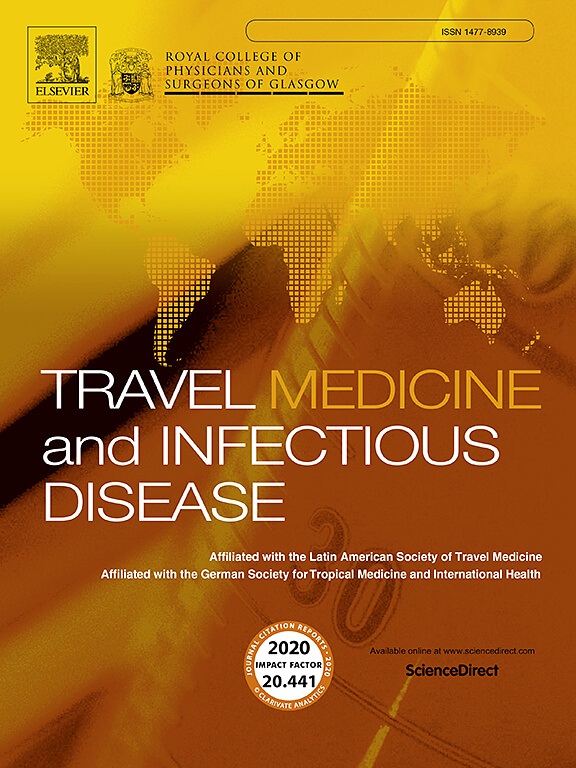英国的利什曼病:在非地方性环境中召开的国家多学科小组会议的经验。
IF 4.7
3区 医学
Q1 INFECTIOUS DISEASES
引用次数: 0
摘要
简介:利什曼病是一种由利什曼原虫属原虫引起的寄生虫病。疾病表型是异质性的,诊断经常被延迟。治疗通常具有挑战性,国际指南建议咨询专家。联合王国利什曼病多学科小组(UKLMDT)会议为临床医生提供了一个可访问的在线论坛,以讨论利什曼病病例,促进获得专业知识并在可能的情况下为患者提供当地护理。方法:使用电子病历对UKLMDT从2021年11月成立到2024年10月的三年讨论进行回顾。向推荐人发送了一份匿名反馈问卷。截至2024年6月,通过由其负责的临床医生完成的单独问卷收集有关所讨论患者治疗结果的数据。结果:在研究期间,UKLMDT共参与了139次患者讨论,涉及80多名患者。略多于一半的个体(45/80;56.2%)患有皮肤利什曼病,四分之一的个体患有内脏利什曼病(20/80;25%),十分之一的个体患有粘膜利什曼病(8/80;10%)。未检出利什曼病7例(8.8%)。总共有24/80(30%)的患者免疫功能低下,但只有4例(5%)是HIV引起的免疫抑制。所有内脏利什曼病病例都是在欧洲获得的,其中大多数是在西班牙获得的。多诺瓦利什曼原虫复合体是最常见的病原体,包括内脏和粘膜疾病,而维亚利什曼原虫亚属在皮肤利什曼病中最常见。粘膜或内脏利什曼病患者比皮肤利什曼病患者更容易出现免疫抑制。患者结果和转诊者对UKLMDT会议的反馈总体上是积极的。讨论:UKLMDT专家论坛的经验提供了对英国非地方性环境中的利什曼病的深入了解。主要发现包括南欧是获得英国利什曼病的主要目的地,免疫抑制宿主中的多诺瓦利什曼原虫复合体(很可能是幼年利什曼原虫)是欧洲粘膜利什曼病的重要原因。uklmd在英国提供公平获取罕见疾病专业知识的机会,并作为国家为其他罕见疾病提供多学科咨询的典范。本文章由计算机程序翻译,如有差异,请以英文原文为准。
Leishmaniasis in the United Kingdom: Experience of a national multidisciplinary team meeting in a non-endemic setting
Introduction
Leishmaniasis is a parasitic disease caused by protozoa of the genus Leishmania. Disease phenotypes are heterogenous, and diagnosis is frequently delayed. Treatment is often challenging, and international guidelines recommend consultation with experts. The UK Leishmaniasis Multidisciplinary Team (UKLMDT) meeting provides an accessible online forum for clinicians to discuss cases of leishmaniasis, facilitating access to expertise and enabling local care for patients where possible.
Methods
Three years of UKLMDT discussions, from its inception in November 2021 to October 2024, were reviewed using electronic patient records. An anonymous feedback questionnaire was sent to referrers. Data regarding treatment outcomes for patients discussed up to June 2024 were gathered using a separate questionnaire completed by their responsible clinician.
Results
The UKLMDT contributed to 139 patient discussions involving 80 patients over in total over the study period. Just over half of individuals (45/80; 56.2 %) had cutaneous leishmaniasis, a quarter had visceral leishmaniasis (20/80; 25 %) and a tenth had mucosal leishmaniasis (8/80; 10 %). Seven patients (8.8 %) were found not to have leishmaniasis. In total, 24/80 (30 %) of patients were immunocompromised, but only in four cases (5 %) was HIV the cause of immunosuppression. All visceral leishmaniasis cases were acquired in Europe, and the majority acquired their disease in Spain. Leishmania donovani complex was the commonest causative agent overall, including in visceral and mucosal disease, whereas Leishmania Viannia subgenus was commonest in cutaneous leishmaniasis. Patients with mucosal or visceral leishmaniasis were more frequently immunosuppressed than those with cutaneous leishmaniasis. Outcomes and feedback on the UKLMDT were generally positive.
Discussion
The experience of the UKLMDT specialist forum provides insight into leishmaniasis in the UK, a non-endemic setting. Key findings include that southern Europe is the primary destination where UK-based leishmaniasis is acquired, and that Leishmania donovani complex (most likely Leishmania infantum) in immunosuppressed hosts is an important cause of mucosal leishmaniasis in Europe. The UKLMDT offers equitable access to expertise for a rare disease in the UK, as well as serving as a model for national provision of multidisciplinary advice for other rare diseases.
求助全文
通过发布文献求助,成功后即可免费获取论文全文。
去求助
来源期刊

Travel Medicine and Infectious Disease
PUBLIC, ENVIRONMENTAL & OCCUPATIONAL HEALTH-INFECTIOUS DISEASES
CiteScore
19.40
自引率
1.70%
发文量
211
审稿时长
49 days
期刊介绍:
Travel Medicine and Infectious Disease
Publication Scope:
Publishes original papers, reviews, and consensus papers
Primary theme: infectious disease in the context of travel medicine
Focus Areas:
Epidemiology and surveillance of travel-related illness
Prevention and treatment of travel-associated infections
Malaria prevention and treatment
Travellers' diarrhoea
Infections associated with mass gatherings
Migration-related infections
Vaccines and vaccine-preventable disease
Global policy/regulations for disease prevention and control
Practical clinical issues for travel and tropical medicine practitioners
Coverage:
Addresses areas of controversy and debate in travel medicine
Aims to inform guidelines and policy pertinent to travel medicine and the prevention of infectious disease
Publication Features:
Offers a fast peer-review process
Provides early online publication of accepted manuscripts
Aims to publish cutting-edge papers
 求助内容:
求助内容: 应助结果提醒方式:
应助结果提醒方式:


